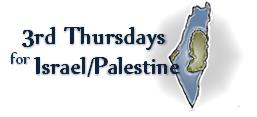3rd Thursday Alert: Tell Congress to restore critical funding and urge ending Gaza blockade
 Every place in the world is in the throes of the COVID-19 pandemic. The disease does not discriminate: people of every race, gender, class, and identity are susceptible and have contracted Coronavirus. Even so, there is a clear difference in vulnerability based on wealth and privilege which determine access to testing, proper health care, and ability to isolate to reduce the spread.
Every place in the world is in the throes of the COVID-19 pandemic. The disease does not discriminate: people of every race, gender, class, and identity are susceptible and have contracted Coronavirus. Even so, there is a clear difference in vulnerability based on wealth and privilege which determine access to testing, proper health care, and ability to isolate to reduce the spread.
Early in the outbreak, both the Palestinian Authority and the Government of Israel declared states of emergency, severely restricting the movement of people and promoting—even mandating—physical distancing.
Many have given credit to the PA’s actions for curtailing the spread of the virus in the West Bank. As of Thursday, April 9, 2020, the number of confirmed cases in the occupied Palestinian territories was 263, with 13 in Gaza. The risk of contagion remains high, due in large part to the lack of access to adequate health care and the reality of high population densities, especially in refugee camps in the West Bank and in general in Gaza.
The most advanced Palestinian hospitals are both located in East Jerusalem—Augusta Victoria Hospital and Maqasid Hospital. Even without circumstances of the pandemic, access for Palestinians not resident in Jerusalem is limited due to Israeli permit systems. In times of extreme movement restrictions, though, they are not accessible at all.
Gaza, with its population of two million Palestinians—most of whom are refugees and depend on the health care services of the United Nations Relief and Works Agency (UNRWA)—is especially at risk. Medical clinics are not equipped to deal with an outbreak, many supplies are prohibited from entry, Gazan Palestinians cannot leave to get care elsewhere, and the high concentration of people means that the virus could spread rapidly with devastating and tragic impact.
The COVID-19 pandemic has simply accentuated many key needs Palestinians have, and has brought to the fore aspects of their lives under occupation and blockade that must be addressed to ensure that Palestinians have access to necessary services and care. In late March, eight senators addressed a letter to Secretary of State Pompeo asking what the Administration’s plans are for safeguarding Palestinian health and humanitarian needs.
Call or write your elected representatives in the Senate and the House and ask them to:
- Use their good offices to pressure Israel to end the blockade of Gaza so that Palestinians there can move freely to the West Bank and East Jerusalem to gain access to medicine, medical supplies, health care, and other basic requirements necessary in this time of pandemic, and beyond;
- Press the US Administration to release the available and approved funds for UNRWA and other humanitarian and health programs in Gaza and the West Bank, funds that are already committed to support Palestinian health and welfare;
- Work urgently to support movement toward a just and peaceful resolution to the conflict, based on international law and UN resolutions, that guarantees justice, peace, and rights for all people—Israelis and Palestinians alike.
Feel free to use the following suggested text if helpful in communicating with your members of congress:
Dear …,
At a time when we are all facing the reality of the COVID-19 pandemic, I write to express my deep concern about the impact of the spread of the Coronavirus on the Palestinian people. We know that the disease does not discriminate: people of every race, gender, class, and identity are susceptible and have contracted Coronavirus. Even so, there is a clear difference in vulnerability due to differing access to testing, proper health care, and ability to isolate to reduce the spread.
So far, the number of Palestinians in the West Bank, East Jerusalem, and Gaza who have contracted Coronavirus is 263, but given the realities of life under Israeli occupation and blockade, this number could easily escalate exponentially. Now is the time to act to safeguard Palestinian lives and health. I therefore write to:
- Use your good offices to pressure Israel to end the blockade of Gaza so that Palestinians there can move freely to the West Bank and East Jerusalem to gain access to medicine, medical supplies, health care, and other basic requirements necessary in this time of pandemic, and beyond;
- Press the US Administration to release the available and approved funds for UNRWA and other humanitarian and health programs in Gaza and the West Bank, funds that are already committed to support Palestinian health and welfare;
- Work urgently to support movement toward a just and peaceful resolution to the conflict, based on international law and UN resolutions, that guarantees justice, peace, and rights for all people—Israelis and Palestinians alike.
Thank you very much for your special attention to this matter of urgent concern.
Sincerely,
